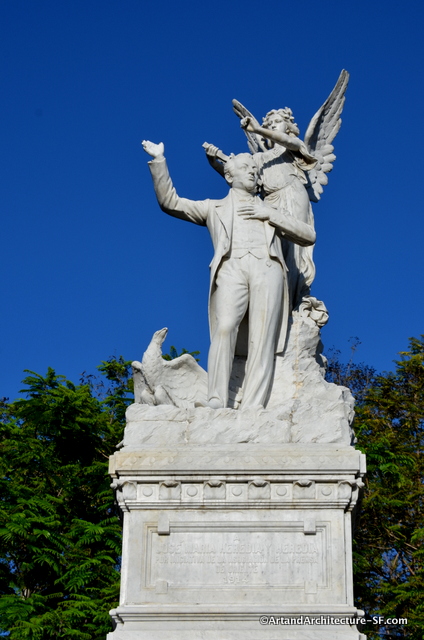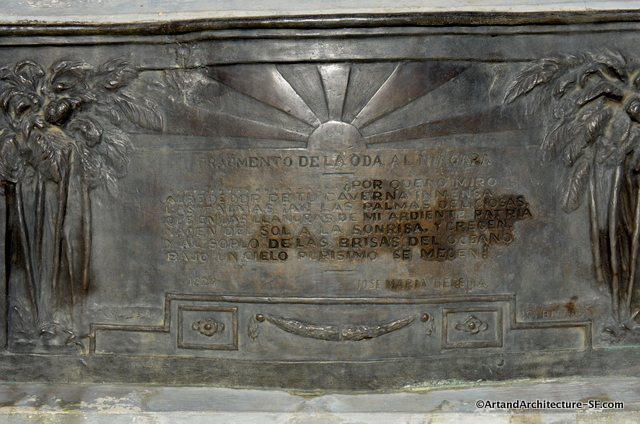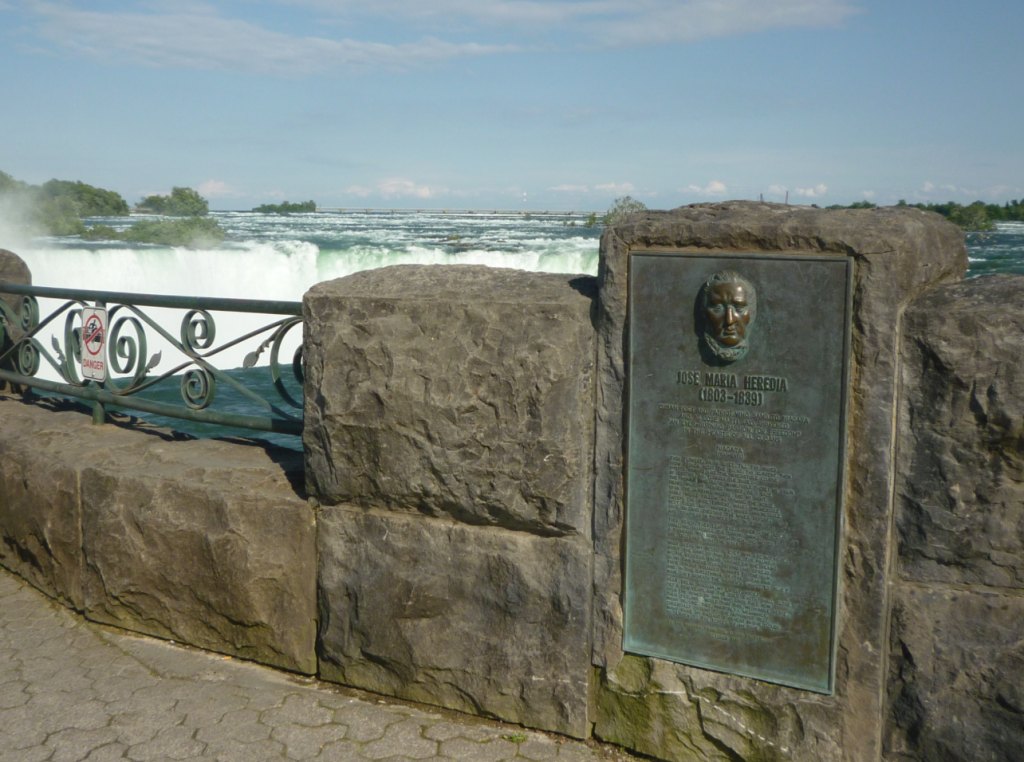Traffic Circle at Avenue Manduley and Calle 11
Santiago de Cuba

According to Cuba Facts Jose Marie Heredia y Heredia was born in Santiago de Cuba on December 31 1803, and lived a short thirty-five years, spending most of his adult life in exile.
In 1818 he enrolled in the University of Havana as a law student, and it was about this time that he met Isabel Rueda, to whom he wrote and dedicated erotic poetry. His first dramatic effort (the play Eduardo IV o el usurpador clemente) was produced by a theatre group in Matanzas.
On October 31 1820, his father died in Mexico.
In November 1823 Heredia joined the secret society: LOS SOLES Y RAYOS DE BOLÍVAR (The Suns and Rays of Bolivar, named after the liberator of South America, Simon Bolivar), which sought independence from Spanish rule. The conspiracy was discovered, and Heredia, disguised as a sailor, escaped to Boston. He later spent time in Philadelphia and New York, where he earned a living as a language teacher.
Heredia’s first collection of poetry was published in 1825, and was dedicated to his uncle, Ignacio. Another collection was published in Toluca in 1832.
On September 1 1836, Heredia wrote to Captain-General (of Cuba) Tacón and requested permission to return to Cuba, claiming that his ideology had changed in the 12 years of his absence.
After he returned to Cuba, he was not very popular with many who called him a “sell-out.” As a result, he returned to Mexico, where he died in May 7 1839.

A fragment of Ode to Niagra.
The sculptor on this piece is not known, however, the statue, erected some time before the Castro revolution, was funded by the Bacardi family.
Ode to Niagara was written n 1824, when Herdia was 20 years old. It is actually an ode to Niagara Falls. It has been said it is the greatest poem written about the falls.
There is a plaque at Table Rock, near the brink of Niagara Falls on the Canadian side.
It reads: “To the Niagara from the Cuban people, October 1989”. Heredia (1803-1839) was exiled in 1823 for penning his first Cuban revolutionary poem The Star of Cuba. Although banished officially to Spain for agitating for Cuban independence, Heredia continued to work for Cuban freedom. In 1831 he was sentenced to death in Havana for “criminal involvement” in a conspiracy for Cuban independence. He died in Mexico at the age of 35.
While in exile, he visited Niagara Falls and wrote his famous “Ode to Niagara”, which was first published 1825. In 1827 William Cullen Bryant was the first to translate it into English. Lines from the poem are inscribed on the plaque.

Photo from WikiCommons
Here is an English translation of the poem:
NIAGARA
My Iyre! give me my Iyre! My bosom feels
The glow of inspiration. O how long
Have I been left in darkness since this light
Last visited my brow, Niagara!
Thou with thy rushing waters dost restore
The heavenly gift that sorrow took away.
Tremendous torrent! for an instant hush
The terrors of thy voice and cast aside
Those wide involving shadows, that my eyes
May see the fearful beauty of thy face!
I am not all unworthy of thy sight,
For from my very boyhood have I loved,
Shunning the meaner track of common minds,
To look on nature in her loftier moods.
At the fierce rushing of the hurricane,
At the near bursting of the thunderbolt,
I have been touched with joy; and when the sea
Lashed by the wind, hath rocked my bark and showed
Its yawning caves beneath me, I have loved
Its dangers and the wrath of elements.
But never yet the madness of the sea
Hath moved me as thy grandeur moves me now.
Thou flowest on in quiet, till thy waves
Grow broken ‘midst the rocks; thy current then
Shoots onward lke the irresistable course
Of destiny. Ah, terribly they rage–
The hoarse and rapid whirIpools there!
My brain grows wild, my senses wander, as I gaze
Upon the hurrying waters, and my sight
Vainly would follow, as toward the verge
Sweeps the wide torrent–waves innumerable
Meet there and madden–waves innumerable
Urge on and overtake the waves before,
And disappear in thunder and foam
They reach–they leap the barrier–the abyss
Swallows insatiable the sinking waves.
A thousand rainbows arch them, and woods
Are deafened with the roar. The violent shock
Shatters to vapor the descending sheets
A cloudy whirlwind fills the gulf, and heaves
The mighty pyramid of circling mist
To heaven. The solitary hunter near
Pauses with terror in the forest shades.
What seeks thy restiess eye? Why are not bere,
About the jaws of this abys s the palms
Ah, the delicious palms-that on the plains
of my own native Cuba spring and spread
Their thickly foliaged summits to the sun,
And, in the breathings of the ocean air,
Wave soft beaneath the heaven’s unspotted blue?
But no, Niagara,–thy forest pines
Are fitter coronal for thee. The palm,
The effeminate myrtle and frail rose may grow
In gardens, arid give out their fragrance there,
Unmanning him who breathes it. Thine it is
To do a nobler office. Generous minds
Behold thee, and are moved, and learn to rise
Above earth’s frivolous pleasures; they partake
Thy grandeur, at the utterance of thy name.
God of all truth! in other lands I’ve seen
Lying philosophers, blaspheming Men,
Questioners of thy mysteries, that draw
Their fellows deep into impiety;
And therefore doth my spirit seek thy face
In earth’s majestic solitudes. Even here
My beart doth open all itself to thee.
In this immensity of loneliness
I feel thy hand upon me. To my ear
The eternal thunder of the cataract brings
They voice, and I am humbled as I hear.
Dread torrent! that with wonder and with fear
Dost overwhelm the soul of him that looks
Upon thee, and dost bear it from itself,
Whence hast though thy beginning? Who supplies,
Age after age, thy unexhausted springs?
What power hath ordered, that, when all thy weight
Descends into the deep, the swollen waves
Rise not, and roll to overwhelm the earth?
The Lord hath opened his omnipotent hand,
Covered thy face with clouds, and given his voice10.
To thy down-rushing waters; he hath girt
Thy terrible forehead with his radiant bow.
I see thy never-resting waters run
And I bethink me how the tide of time
Sweeps to eternity. So pass of man–
Pass, like a noon-day dream–tbe blossoming days,
And he awakes to sorrow. I, alas!
Feel that my youth is withered, and my brow
Plowed early with the lines of grief and care.
Never have I so deeply felt as now
The hopeless solitude, the abandonment,
The anguish of a loveless life. Alas!
How can the impassioned, the unfrozen heart
Be bappy without love? I would that one
Beautiful,–worthy to be loved and joined
In love with me,–now shared my lonely walk
On this tremendous brink. ‘Twere sweet to see
Her sweet face touched with paleness, and become
More beautiful from fear, and overspread
With a faint smile, while clinging to my side!
Dreams–dreams! I am an exile, and for me
There is no country and there is no love.
Hear, dread Niagara, my latest voice!
Yet a few years, and the cold earth shall close
Over the bones of him who sings thee now
Thus feelingly. Would that this, my humble verse,
Might be like thee, immortal! I, meanwhile,
Cheerfully passing to the appointed rest,
Might raise my radiant forehead in the clouds
To listen to the echocs of my fame.